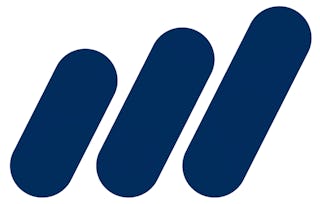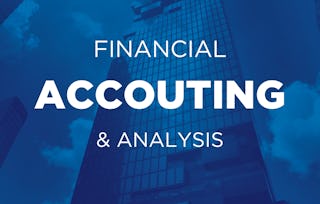Financial Accounting, the language of business, is essential for anyone interacting with financial information. Whether you're a business owner, manager, or just starting your career, understanding financial statements is crucial. This course provides the fundamentals of financial accounting, empowering you to interpret financial statements like balance sheets and income statements for informed decision-making. You'll gain the conceptual base for further learning in accounting and finance. No prior experience is needed. Practice your skills using Microsoft Excel, a critical tool in finance and accounting. Understand the basics of accounting, improving your business and potentially unlocking free courses and certificate opportunities along the way.

Accounting: Principles of Financial Accounting

Accounting: Principles of Financial Accounting
This course is part of multiple programs.

Instructor: Marc Badia
165,090 already enrolled
Included with
3,318 reviews
What you'll learn
Utilize accounting principles for informed business decision-making.
Skills you'll gain
Details to know

Add to your LinkedIn profile
9 assignments
See how employees at top companies are mastering in-demand skills

Build your subject-matter expertise
- Learn new concepts from industry experts
- Gain a foundational understanding of a subject or tool
- Develop job-relevant skills with hands-on projects
- Earn a shareable career certificate

There are 4 modules in this course
Welcome! Before you start today's videos, please have a look at the syllabus. In this first module, I'll give you an overview of what accounting is all about and why it's important to have a basic proficiency in this "language." In addition, I'll introduce one of the most important financial reports - the balance sheet - and a practical real-world case so you can put theory into practice.
What's included
10 videos7 readings2 assignments
Now that you are familiar with the balance sheet, in this second module we'll learn how to account for a variety of transactions. In addition, I'll introduce you to another key financial report: the income statement.
What's included
11 videos4 readings2 assignments
Now that you have a good grasp of the balance sheet and income statement, I'll help you master how to recognize the transactions we went over in the second module. I'll also introduce a third financial report - the cash flow statement - and discuss liquidity.
What's included
14 videos3 readings2 assignments
By using accrual accounting we can measure performance when a financial transaction takes place, even if no cash has actually changed hands. In this final module, we'll discuss the difference between accrual and cash accounting and also read and interpret a real enterprise's financial statements.
What's included
11 videos6 readings3 assignments1 peer review
Earn a career certificate
Add this credential to your LinkedIn profile, resume, or CV. Share it on social media and in your performance review.
Instructor

Offered by
Explore more from Finance
 Status: Free Trial
Status: Free TrialUniversity of Virginia
 Status: Free Trial
Status: Free TrialCorporate Finance Institute
 Status: Preview
Status: PreviewPolitecnico di Milano
 Status: Free Trial
Status: Free TrialFundação Instituto de Administração
Why people choose Coursera for their career

Felipe M.

Jennifer J.

Larry W.

Chaitanya A.
Learner reviews
- 5 stars
85.20%
- 4 stars
12.62%
- 3 stars
1.17%
- 2 stars
0.15%
- 1 star
0.84%
Showing 3 of 3318
Reviewed on Jun 30, 2017
Excellent teaching style and ver god knowledge. I am now able to read and understanding the balance, income statement, profit and loss statement and cash statement of various companies.
Reviewed on Oct 5, 2020
Its an Good course to know more about basic of Accounts, it will help u to learn more about basic and clear out issue regarding balance sheet. Income statement and financial statements.
Reviewed on Jul 16, 2017
Its pretty easy to understand with a relevant real world example on how to understand financial statements. It also provide further reading which is helpful for ones who want to learn more

Open new doors with Coursera Plus
Unlimited access to 10,000+ world-class courses, hands-on projects, and job-ready certificate programs - all included in your subscription
Advance your career with an online degree
Earn a degree from world-class universities - 100% online
Join over 3,400 global companies that choose Coursera for Business
Upskill your employees to excel in the digital economy
Frequently asked questions
To access the course materials, assignments and to earn a Certificate, you will need to purchase the Certificate experience when you enroll in a course. You can try a Free Trial instead, or apply for Financial Aid. The course may offer 'Full Course, No Certificate' instead. This option lets you see all course materials, submit required assessments, and get a final grade. This also means that you will not be able to purchase a Certificate experience.
When you enroll in the course, you get access to all of the courses in the Specialization, and you earn a certificate when you complete the work. Your electronic Certificate will be added to your Accomplishments page - from there, you can print your Certificate or add it to your LinkedIn profile.
Yes. In select learning programs, you can apply for financial aid or a scholarship if you can’t afford the enrollment fee. If fin aid or scholarship is available for your learning program selection, you’ll find a link to apply on the description page.
More questions
Financial aid available,

